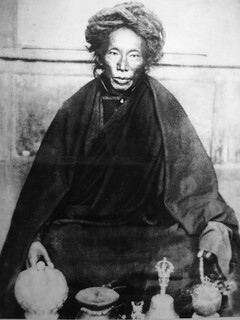Tertön Sogyal’s Advice
Literary Genres › Advice | Schools & Systems › Dzogchen | Practices › Meditation | Tibetan Masters › Tertön Sogyal
English | Deutsch | Español | Français | 中文 | བོད་ཡིག

Tertön Sogyal Lerab Lingpa
Courtesy of Tertön Sogyal Trust
Further information:
Advice
From the lips of Nyala Sogyal:
Whilst resting in meditation, you may take care of your practice like a mother her baby. But if, at that time, your rigpa is not radiantly aware, then you will not be able to liberate even a single thought.
What is it you have to liberate?
Good and bad circumstances—these two.
Good circumstances can creep in stealthily, like thieves, and if you are not able to be on guard, notice them and liberate them, they will become the demonic force of devaputra (seduction through desire).
Bad circumstances will come more obviously, aroused by things like attachment to the form of an attractive woman (or man) or aversion towards an enemy.
If you are not able to liberate them, then when you meet the actual circumstances themselves, your true failing as a Dharma practitioner will be exposed.
Now, what is it that liberates?
The wisdom of rigpa.
What is it you liberate?
Arising thoughts, good and bad.
How do you liberate them?
Each thought, upon arising, like waves dissolving back into the water they came from.
The real, true sign of whether you can liberate or not is when you actually meet, face to face, negative circumstances and thoughts, which arise blazing like a raging fire or bubbling like boiling water. If at that very moment you are able to liberate them, then that is really the same as a true miracle.
If you are able to liberate one attachment, one aversion, one negative thought, then many aeons of negative karma are purified.
Such a person I call a mahāsiddha; such a person I call clairvoyant—even omniscient.
In case you might not have heard this kind of advice before, I thought you might find it amusing. So I, the old man, offer it to Lama Lobsang and Gelek—please accept it with joy!
| Translated by Rigpa Translations from a manuscript provided by Kyabje Dudjom Rinpoche. Edited for Lotsawa House, 2019.
Version: 2.2-20230417